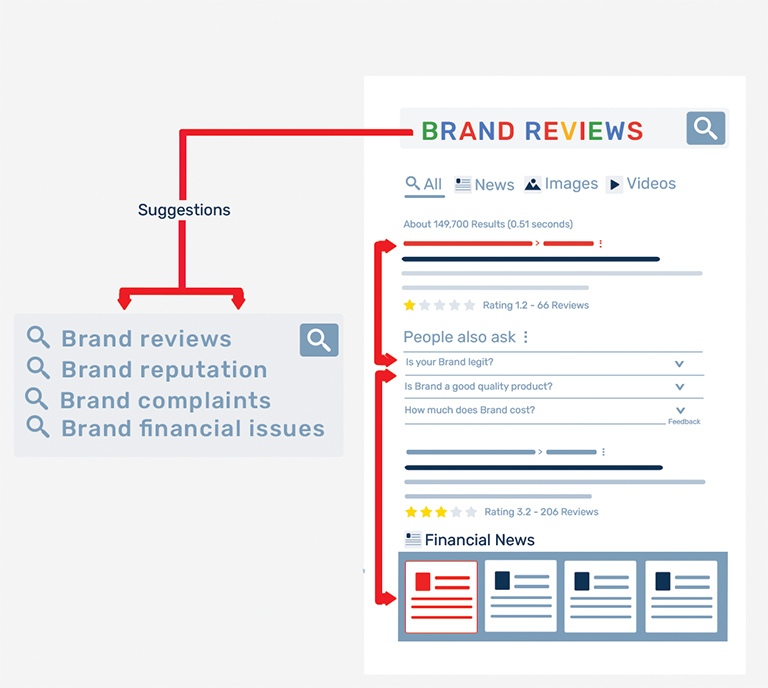Is reputation a Google ranking factor?
Google’s introduction of E-A-T (Expertise, Authoritativeness, Trustworthiness) – and subsequent changes made to the Search Quality Raters Guidelines – have brought legitimacy to the idea that reputation as a whole is considered by Google’s ranking systems.
But compared to other ranking signals (e.g., page speed, mobile friendliness), it is less tangible. There are no diagnostic tools that will give you an E-A-T performance score.
Additionally, E-A-T doesn’t just impact your website’s ability to rank, it also affects how and where results are displayed for branded keywords.
Reputation, Expertise, Authoritativeness, and Trustworthiness seem to be intertwined. Each E-A-T factor participates in establishing reputation but on a different level:
- Expertise is how I demonstrated that I acquired knowledge through learning and the practice of my craft.
- Authoritativeness is others recognizing my expertise, my peers endorsing me, and how frequently I am cited as an expert.
- Trustworthiness is how I demonstrated that I am reliable, not deceitful and that I haven’t caused harm to the community.
Interestingly enough those factors apply not just to websites but to individuals as well.
Expertise & SEO
When it comes to expertise and Your Money Your Life topics, such as finance or healthcare, credentials are incredibly important. You can’t be authoritative about a health topic without having the proper knowledge, expertise, and experience.
Within this context, it is clear that Google has improved the quality of its search engine results pages (SERPs) for health-related topics by rewarding higher visibility to content produced by medical experts. Google has tried to remove all potentially harmful or deceitful content from its search results.
When YMYL is not an issue, Expertise comes down to the professionalism of the content produced.
Is the content produced with journalistic standards or integrity? Is it newsworthy?
“But it will require for the author to still be both authoritative and trustworthy. This means that how his or her body of work is perceived will also have to be factored in.”
Authoritativeness & SEO
Authoritativeness is almost a no-brainer. It is very much like in academia where the author whose work is the most cited by his or her peers in his or her domain is recognized as the most authoritative.
This goes back to the core of SEO and how links were intended to pass authority before they were used to manipulate rankings.
Trustworthiness & SEO
The Trustworthiness factor is the most interesting part in this equation.
Beyond the theory, we now see in practice the connection between how the customer or employee experience is portrayed on review sites, news sites, forums, social media, and how it shapes the SERPs.
News and Review sites are very pertinent as they have the potential to harm a company’s reputation.
YMYL issues can often surface in negative reviews. They can also be featured in news articles.
Customer complaints about defective products, poor quality, deceitful financial practices go to the heart of the matter.
Having a bad review rating on some sites may lead to having unfavorable content consolidated at the top of search results pages in the related question pack under is your brand legit.
A negative news article can be suggested either in the search bar or in related questions.

What is of concern is that we are facing an unprecedented spread of fake and negative reviews, as well as content in general.
Unfortunately, disgruntled customers and employees tend to be more vocal than the rest of us.
Furthermore, outdated content sticks around for years, long after an issue is fixed.
Protect Your Brand Reputation with E-A-T & SEO
In the doctor example previously mentioned, there is no doubt that for equivalent level of authoritativeness, patient reviews and news articles whether fair or unfair will affect the outcome.
More than ever, it is important to curate your online brand perception.
As a result of the increased importance of trustworthiness, the retail, manufacturing, healthcare, finance, and real estate sectors as well as other industries are looking for solutions to help them manage their online reputation.
This article was first published on SearchEngineJournal, the views and opinions are of the writer and may not necessarily reflect DigitalDev.


